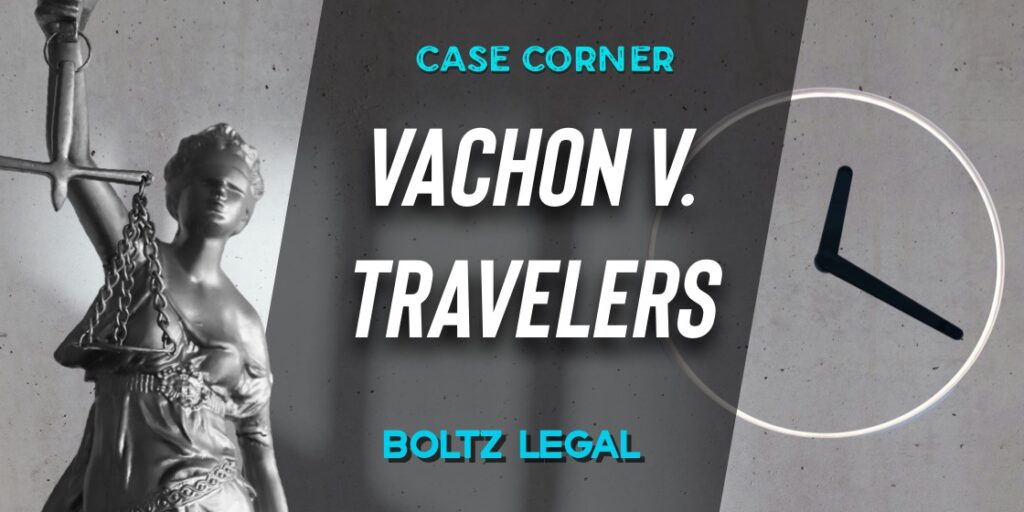Bad Faith Insurance, Civil Remedy Notice, Waiver, and Florida’s Precedential Case Law
Torts – Insurance – First-Party Bad Faith – Civil Remedy Notice – Waiver – Summary Judgment – Appellate Review
Background: A Decade-Long Legal Battle Over Underinsured Motorist Coverage
Insurance disputes involving bad faith claims can be complex, often requiring a Civil Remedy Notice (CRN) as a statutory prerequisite before litigation. In Vachon v. The Travelers Home and Marine Insurance Company, the Second District Court of Appeal reversed a summary judgment in favor of Travelers, ruling that the insurer waived its right to challenge the specificity of the CRN by failing to object to it for nearly nine years.
The case is significant because it reinforces Florida’s waiver doctrine in bad faith insurance claims and clarifies the binding nature of appellate precedent over trial court rulings.
The Origins of the Bad Faith Lawsuit
1. The Underlying Car Accident and Initial Claim
- In 2011, Darryl A. Vachon was rear-ended by another driver with only a $10,000 GEICO liability policy.
- Vachon sought compensation under his underinsured motorist (UM) coverage with Travelers, but the insurer refused to pay benefits.
- In July 2012, to preserve his right to a first-party bad faith claim, Vachon submitted a Civil Remedy Notice (CRN) under § 624.155, Fla. Stat., alleging improper claim handling.
- Travelers responded in September 2012, denying any wrongdoing but never objected to the sufficiency of the CRN.
2. Lengthy Litigation and Two Jury Verdicts
- In March 2013, Vachon sued Travelers for UM benefits.
- The case involved two appeals, a federal court removal and remand, and a jury trial resulting in a verdict exceeding Travelers’ UM policy limits.
- The trial court granted a new trial, leading to a second jury verdict for Vachon in an even greater amount.
- Following the verdict, Vachon amended his complaint to add a bad faith claim, as allowed under Fridman v. Safeco Ins. Co. of Illinois, 185 So. 3d 1214 (Fla. 2016).
3. Travelers’ Delayed Challenge to the CRN
- In 2021, nearly a decade after the CRN was filed, Travelers moved to dismiss the bad faith claim, arguing that the CRN lacked sufficient specificity under Florida law.
- The trial court denied the motion, but Travelers raised the CRN issue again as an affirmative defense and later moved for summary judgment on that ground.
- A successor judge granted summary judgment in favor of Travelers, ruling that the CRN was deficient.
Key Legal Issues on Appeal
1. Waiver: Did Travelers Lose the Right to Challenge the CRN?
Florida law clearly states that an insurer waives any objections to the sufficiency of a CRN if it:
- Fails to raise objections within the statutory 60-day cure period
- Responds to the CRN on the merits without raising specificity concerns
The appellate court ruled that Travelers waived its right to object because:
- Its September 2012 response addressed the CRN’s merits but did not challenge its specificity.
- Travelers litigated the UM claim for nine years without raising the CRN issue.
- Florida courts have consistently held that an insurer cannot challenge a CRN’s specificity for the first time years later.
The court cited Neal v. GEICO Gen. Ins. Co., 358 So. 3d 749 (Fla. 4th DCA 2023), which held:
“An insurer waives the right to object to a CRN’s sufficiency if it responds to the notice on the merits without raising an objection.”
The Second DCA found no legal basis for Travelers’ argument that only technical deficiencies can be waived, stating that waiver applies to all types of CRN deficiencies.
2. Improper Reliance on Trial Court Orders and Per Curiam Affirmances
Travelers relied heavily on trial court rulings and a per curiam affirmance (PCA) from another case (Cassella v. Travelers Home & Marine Ins. Co., 352 So. 3d 1290 (Fla. 2d DCA 2023)).
The appellate court rejected this reliance, stating:
- Trial court rulings are not binding precedent.
- Per curiam affirmances (PCAs) have no precedential value and cannot be cited as controlling authority.
- Only appellate court rulings are binding on Florida trial courts.
This clarification reinforces that Florida’s appellate decisions govern legal issues statewide, preventing insurers from misusing non-binding trial court rulings to justify summary judgment.
Conclusion and Legal Impact
The Second District Court of Appeal reversed the trial court’s ruling and remanded the case for further proceedings, setting an important precedent for bad faith insurance litigation in Florida.
Key Takeaways from Vachon v. Travelers:
- Waiver applies to all objections to a CRN’s specificity if an insurer fails to timely raise them.
- Insurers cannot challenge a CRN’s sufficiency years after responding to it without objection.
- Trial court orders and per curiam affirmances do not establish binding precedent.
- Florida law prioritizes fairness by preventing insurers from using procedural technicalities to avoid bad faith claims.
This ruling is a win for policyholders facing bad faith insurance disputes and reinforces Florida courts’ commitment to holding insurers accountable for delaying and denying valid claims.
Todays Insight
“The secret of getting ahead is getting started.”
— Mark Twain

